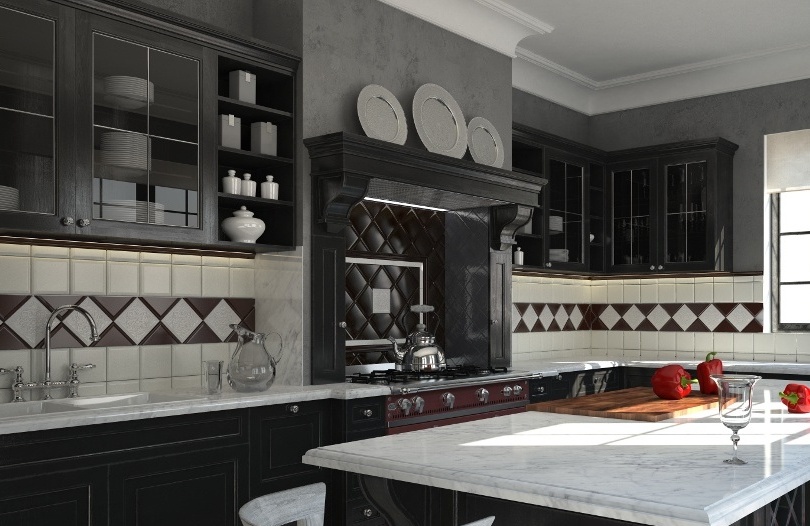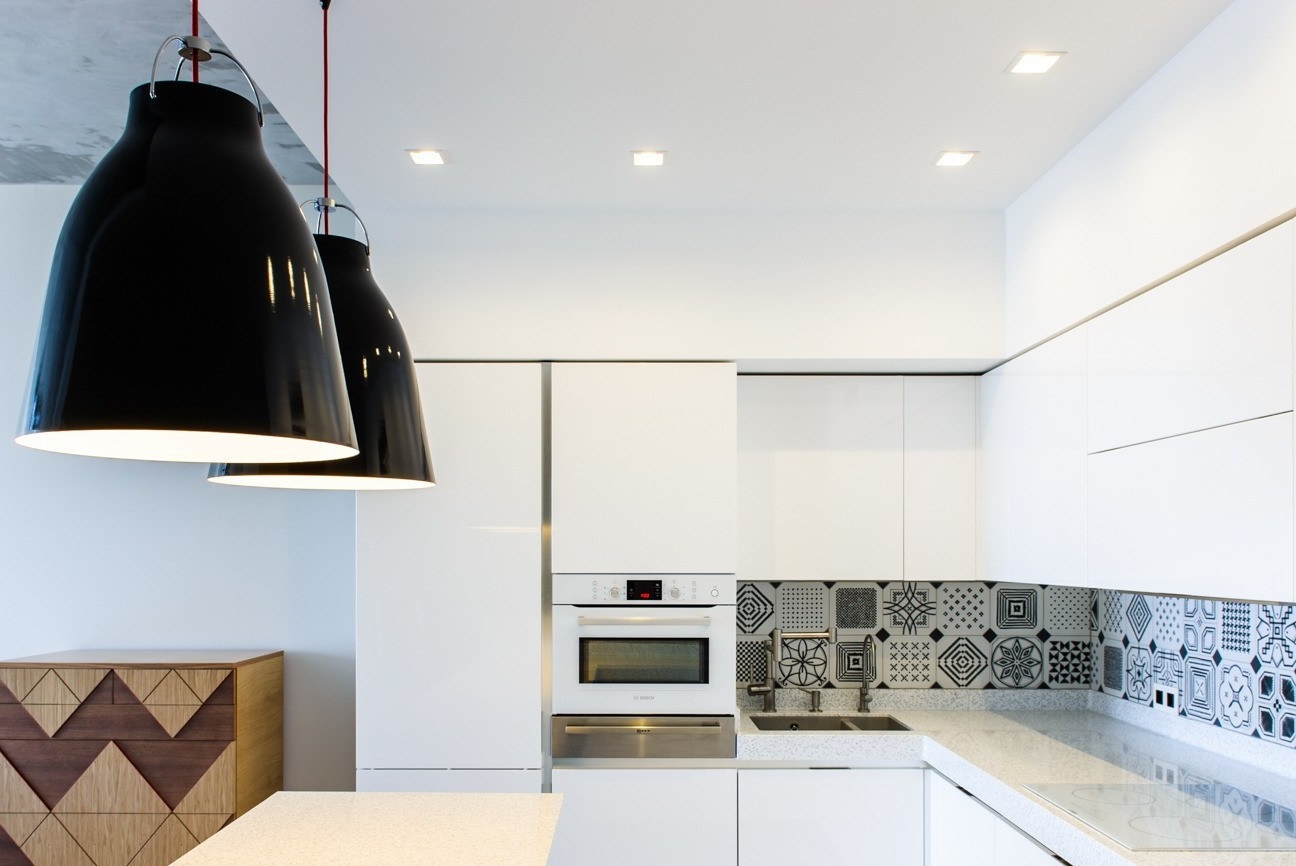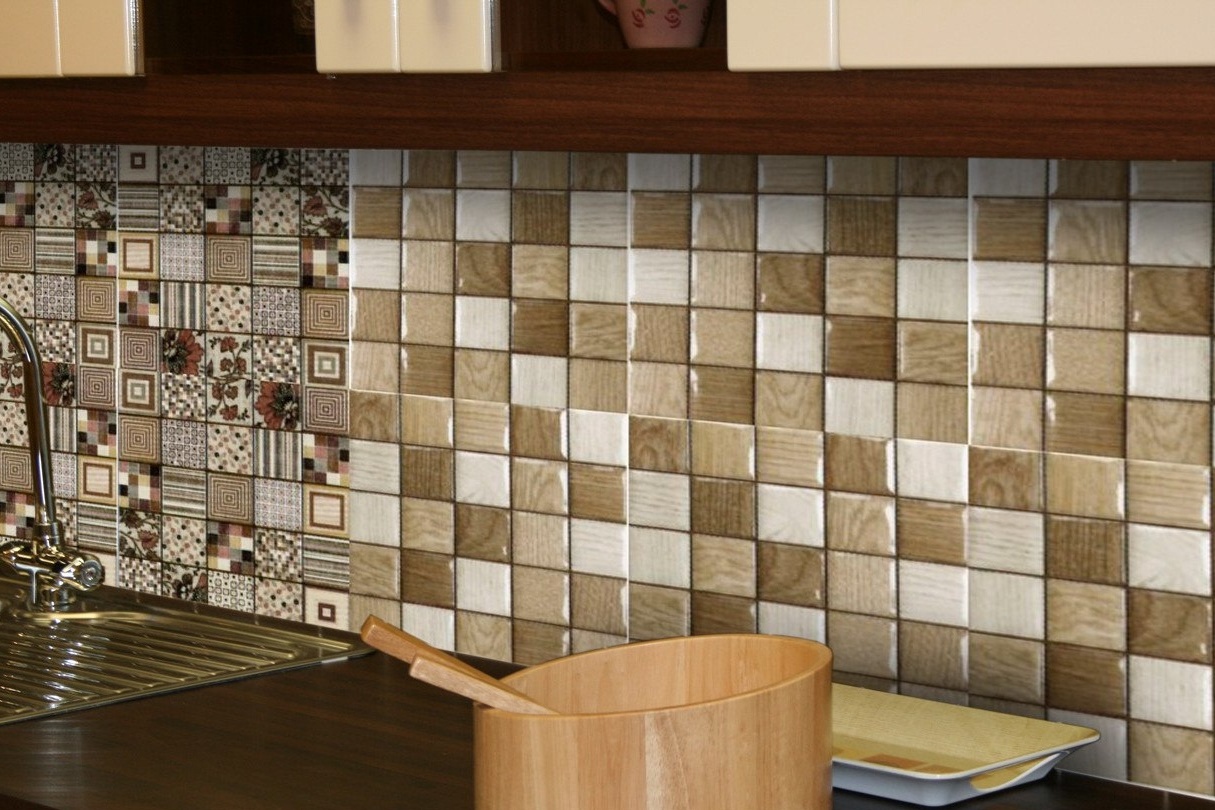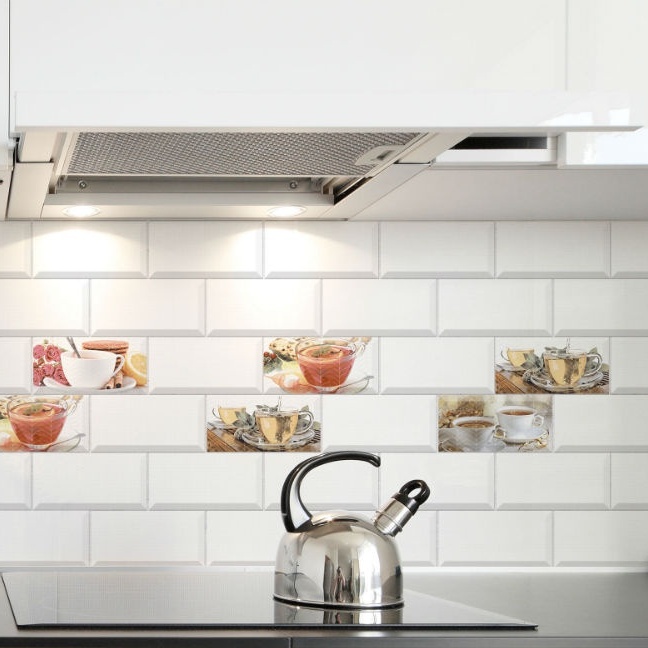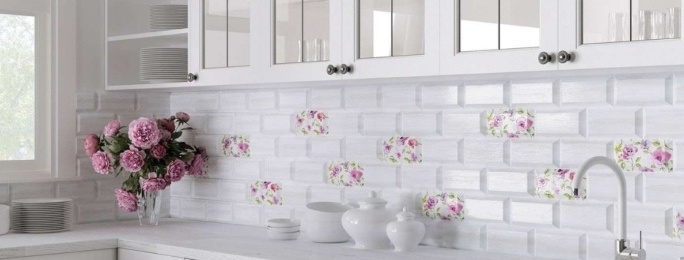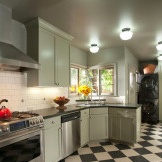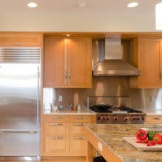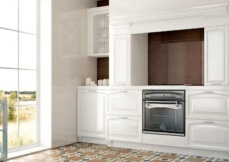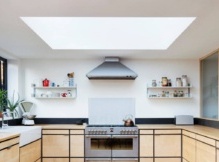Tile for the kitchen on the apron: the best ideas for decorating the wall above the work area
Content:
- Practical solutions
- Advantages and disadvantages
- Choice of options
- Patterns and trendy colors.
- Ceramic tile and more
- Different types of classification
- Kitchen style
- Tiled seam
- Tile and room parameters
- The combination of an apron with other elements of the kitchen
- How to put tiles in the kitchen?
- Wallpaper in imitation tiled
- Unusual ideas
- Hexagonal tile
- Boar tile
- Geometric abstraction
Kitchen tile is the material that is most often chosen for the wall above the countertop, that is, on an apron. Kitchen tiles are produced in various sizes and styles, so they are suitable for both modern and traditional kitchens. Which tile for the kitchen to choose?
An apron for a kitchen from a tile: a photo of practical solutions
The wall in the kitchen between the countertop and hanging cabinets is always visible and attracts attention. So it can be an interesting decoration of the room, unlike any other place, often giving the room a special style. In addition to aesthetic values, the properties of the material are also taken into account - the wall above the kitchen table is one of the places most susceptible to pollution, so it requires special decoration. Therefore, the area should be covered with material that fits inside and is easy to clean. Ceramic tiles would be a good choice.


Ceramic tile is the material that is most often chosen for walls above the kitchen counter. No wonder, as it is non-flammable, easy to clean and resistant to water and steam. However, the popularity of tiles does not mean that the walls trimmed with them should look standard and boring. A wide range of ceramic tile manufacturers provides the buyer with a large selection and interesting solutions. To achieve the original effect, you can choose tiles that imitate wood, intense color or an unusual pattern.
Advantages and disadvantages of tiles
The surface above the kitchen worktop must be particularly resistant to moisture, high temperatures, as well as stains, including greasy. Therefore, it is worth choosing tiles with a large layer of enamel, and if you choose other finishes, do not forget to properly impregnate, clean and periodically maintain the material. Tiles should be selected in accordance with the style in which the kitchen is decorated, taking into account the color of the countertops, furniture or floor. Do not forget to plan the method of finishing the surface above the countertop, also provide holes for electrical outlets.
Tile Advantages:
- many interesting models, decor;
- wide range of prices;
- many of them are also very durable and allow you to protect the wall over the countertop for a long time;
- harmonious combinations with other finishes;
- durability and resistance to high temperature and humidity;
- easy to clean while maintaining a high level of hygiene in the kitchen.
Disadvantages of tiles:
- some of the models require impregnation and regular maintenance (especially stone ones);
- if there are tile seams should be processed and regularly cleaned;
- This decision is for many years, therefore it is not suitable for those who like frequent changes of arrangement;
- laying takes a lot of time, knowledge and skills.



Tiles for the kitchen: apron working area - a choice of options
The aesthetics of the wall above the kitchen worktop is important, but do not forget about practical considerations. Remember that this surface is particularly susceptible to dirt and spray. This is especially true for wall fragments at the sink and hob. Therefore, choose ceramic tiles that are easy to clean. It is best if their surface is smooth, covered with a thick layer of enamel.Then dust and other dirt will not settle on the surface so easily. Small wall tiles in the shape of a square or elongated rectangle serve well in the work area in the kitchen. In the case of small tiles, the surface of the joints is more prone to contamination. To facilitate care, you should choose larger tiles or straightened models that allow you to make really thin seams (1-1.5 mm). In the case of traditional, wider joints between the tiles, it is worth using an epoxy compound, as it is practically waterproof and not afraid of chemical cleaners.


Tile for the kitchen on the apron: patterns and trendy colors
Wall tiles are an easy-to-install solution that offers a variety of styling options. It comes in different formats, colors, and can be made of ambiguous materials. It also has a lot of design, size and decor. You can choose from a mass of varieties, which allows you to create an effective finish, seasoned with ingenuity.
You can try modern and traditional cuisine in a retro, Provencal and even rustic style. See many interior design suggestions for kitchen tiles. You can beautifully decorate the space above the kitchen worktop using only this material. In a modern minimalist kitchen, the colored wall above the countertop will become an attractive element that will enliven the interior and give it an original character.
The fashionable design of kitchen tiles increasingly appears not only on the walls, but also on the floor. However, patterned ceramics are a risky option. Fashion is changing too fast. Currently, the design of ceramic tiles is dominated by geometric motifs, but also in the 3D version. A kitchen tile with a texture allows you to revive the wall, which with proper lighting will be very effective. It is interesting to combine smooth tiles with a relief pattern - clear, deeply cut lines are additionally highlighted in bright color, which gives the effect of an abstract pattern. Kitchen tiles can have oriental motifs, characterized by patterns with fuzzy lines.
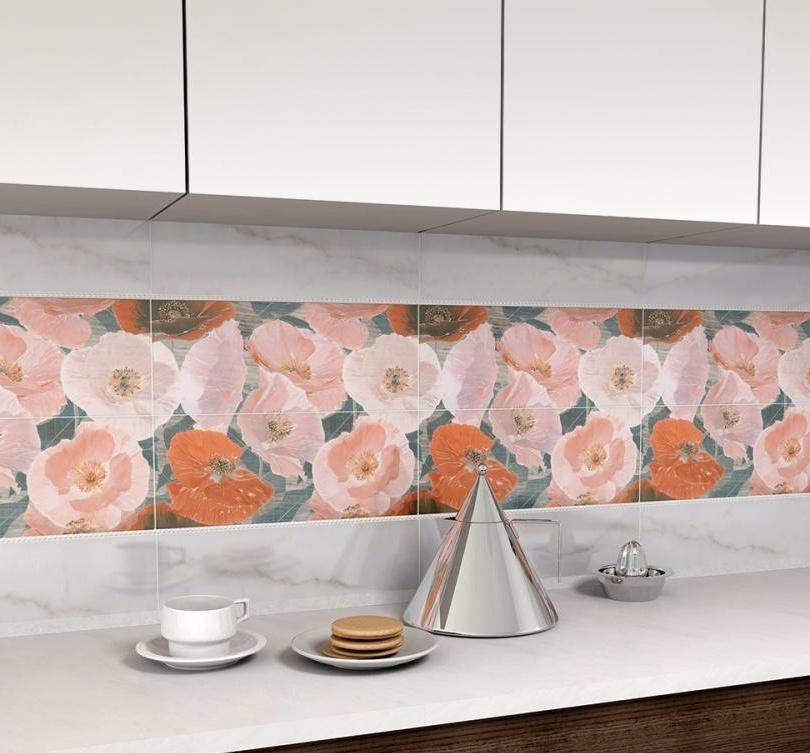
Abstract watercolor prints on a canvas-like background are popular, as this is another mention of art. This motif on a kitchen tile, resembling canvases, is created by applying many layers of paint or a painter’s palette, scratched with a spatula after finishing work. All of these tiles have one more thing in common. These are not only the so-called decors, but also modules that can be freely composed and covered with large surfaces, forming magnificent decorations. Solid bricks are also trendy.
White tile on kitchen apron
When choosing tiles, you should also pay attention to their color. White or cold tiles will add freshness and sterility to your kitchen. This option goes well with both a rural and a modern room. Metal and natural concrete simulations, as well as finished in natural tones, are ideal for minimalist and industrial kitchens. For ethnic or rustic interiors, choose white tiles in combination with stylish decor in natural and warm colors. A tile with catchy colors, such as red, will stimulate your appetite and add a bit of spiciness.
Neutral colors
There is no doubt that more and more people are striving for tiles in a universal neutral color palette. They are usually a delicate gray, warm beige or ivory. It turns out, however, that even at first glance, such boring colors can be diluted, since all you need to do is combine them with the appropriate structure. Particularly noteworthy are wall tiles that resemble sandstone or other natural stone with an uneven surface.
Gray tiles will also become more expressive if they are decorated with an original pattern, for example, geometric or patchwork masonry. This will allow the kitchen decoration to acquire a universal palette of colors, but at the same time with a touch of modernity.
Monochrome compositions
Monochrome compositions, for example, in the Scandinavian style, have long enjoyed unrelenting popularity. It is important to note that the tile of white, gray and black colors not only looks interesting, but it is also universal. Thus, you can pick up furniture of almost any color, getting an interesting effect. It will also allow you to subsequently reorganize the kitchen without losing any aesthetics, as you can easily combine new furniture and household appliances with walls and floors in monochrome colors.
Ceramic tile for apron kitchen
Ceramic tile is one of the most popular and classic solutions. It is very durable, effective and resistant to the harsh conditions prevailing in the kitchen. You will find a mosaic of interesting combinations, as well as glass plates or those that imitate stone, concrete, wood or metal.
The use of ceramic tiles is the most classic way of decorating the working wall in the kitchen, it is still very popular. Choosing such a traditional cladding, you can get an unusual look of a kitchen apron.
Not only ceramic tiles
In addition to ceramic tiles, tiles from natural stone, a mass resembling natural concrete, brick or metal, are increasingly being selected. The material gives a very original effect, and at the same time quite practical. Metal is a good alternative to sheet metal, because it looks more decorative, it is easy to lay. The result is suitable for both modern and industrial kitchens, combining a beautiful view with modern trends.
Products made of natural stone or its imitation combine well with natural and ethnic interiors. You can get them in the form of plates and panels, as well as interesting stone mosaics. Although marble slabs do not require much impregnation, models made of travertine or other porous materials should be thoroughly impregnated (preferably before grouting), because in kitchen conditions they are destroyed. However, despite this, they are willing to choose an apron, because they look really impressive and suit many styles.
If you want the kitchen decoration to have an extraordinary appearance, you should choose nice wood or plastic panels, a very stylish, interesting design, texture and decor. But such material is quite demanding when it comes to impregnation, cleaning and care. In addition, not all are suitable for the area above the stove. Plastic panels often have limited heat resistance, while wood panels require strong impregnation.
Remember that cleaning wood panels and tiles can be cumbersome, requiring careful impregnation and frequent care. However, despite the need to perform many care procedures, the natural charm of a tree is indispensable, so it is often used even on a kitchen apron. More and more people want wooden panels in the kitchen, because they allow you to create a modern and idyllic mood.
Apron of modern kitchen: tiles of different types
Tiles based on their manufactured material:
- ceramics (tile, tile);
- glass;
- clinker;
- wood or wood materials;
- metal;
- plastic;
- stone or its imitation.

Classification by way of laying:
- Classic with slightly profiled edges - most often used, they require a fairly wide seam (depending on the size of the tile: usually from 2 to 10 mm).
- Straightened - allow almost seamless tile laying (grout even about 1 mm). They allow you to get an almost uniform panel that not only looks good, but is also easy to maintain.
- Small mosaics that require precise guidance (usually about 1-2 mm wide). Many of them are very effective, but do not forget to choose a durable seam and the fact that they will require careful and frequent cleaning.
- With rounded edges - to create attractive combinations. Depending on the combination, they correspond to both rustic and ethnic style.

Tiles according to shape:
- Square tiles are the most popular, they come in different sizes and colors, they can be decorated with interesting options, including both classic and modern compositions.
- Small mosaics are a very effective option, although they are often used for spacious kitchens, because they can optically reduce them.
- Rectangular tiles resembling the edge of a brick. There are various colors: white, terracotta or with interesting colors and textures.
- Large-format panels and tiles - allow you to create an almost uniform smooth surface, look good in spacious kitchens. They have a different shape, they are willingly chosen for modern and small rooms, which allows you to optically increase the interior.

Tile by style:
- Ethnic
- village;
- classic
- modern (often with a touch of glamor);
- decorative, which can complement the classic version.

Define your kitchen style
When thinking about which tiles for the kitchen to choose, you first need to decide on the general style of the room. The development of interior design always begins with a general idea of the whole room, and only then individual elements are selected that correspond to the entire design. The style of wall tiles can both emphasize the overall design of the kitchen, and make a significant discord. Under the concept of style, you will choose the color and shape of the wall tiles. A wide range of finishes in stores includes tiles from white to black, from light to dark, almost in a full range of colors.
It should be remembered that white tiles are ideal for kitchens in the Scandinavian style, gray and imitation concrete are suitable for rooms in industrial design, and wooden models in eco-style. You can also choose decors that make your interior look rustic or, for example, Moroccan. Models with a smooth homogeneous surface, sustained in expressive colors, fit into the modern interior, and cream, beige or brown, additionally decorated with traditional ornaments, well complementing the classic decor.


It is worth thinking, you need to choose tiles with a matte or satin finish? The first option looks good in a rustic and minimalist interior, it is easy to keep clean and there are no stains on the surface. Satin tiles are perfect in modern and elegant kitchens, often optically enlarging them and adding a pinch of glamorous style. However, the disadvantage is the need for regular cleaning, and sometimes polishing, because a lot of dirt is very visible.

Tiled seam: features of choice
In addition to tiles, the choice of seams is important. Remember that the more connecting seams, the more difficult it will be to clean the surface. In addition, moisture, dirt and mold can accumulate in the cavities. For the wall above the countertop, it is worth choosing durable, flexible, and also resistant to calcium and mold deposits (an epoxy compound is usually recommended). Dark seams are more practical because dirt is not visible on them, but they are not suitable for every tile. If you want to easily maintain a clean surface, consider choosing straightened tiles. They will provide a smooth, easy-to-clean surface (with joints of approximately 1 mm).
What else to look for when choosing a tile?
In addition to the practical function, it is also worth paying attention to the aesthetic values of tile joints. They are available in many colors, you can also choose decorative compounds (for example, with gloss). Pay attention to the solutions, similar in color to the tiles, but also contrasting.It is worth picking them up to the entire arrangement, also taking into account the color of the countertops, furniture and floor.
Choosing the shape and size of tiles, starting from the parameters of the room: practical tips
If the color and texture of the tile are already selected, it remains to determine only their size and shape. At this stage, it is worth recalling some important tips that will also allow you to optically fit the tiles to the room.
In small kitchens, large tiles should be avoided. The visual perception of the wall above the kitchen worktop also depends on the grout, which creates perpendicular lines between the tiles. For large tiles, these lines can fall out in random places and divide the room too clearly. In addition, there is also the risk of a large amount of waste after the necessary cutting of tiles.
Smaller tiles are better for small kitchens. They can be square or rectangular models. This choice already depends on the overall style of the kitchen. To slightly enlarge the room, it is worth choosing a shiny tile or with mirrored elements. Mosaic for the apron will also look good.
Large kitchens let you experiment. Large tiles will work perfectly in them, so you get the effect of an almost uniform smooth wall. With modern and minimalist decorations, they will fully fulfill their task. Using mosaics in large and open kitchens can give a glamor effect. This type of kitchen decoration will lose all its charm, merging into a large space.

Expert Advice! If your kitchen is small, it is best to choose a wall tile of bright colors and high gloss. Thanks to this, the room will look optically larger. It is also a good idea to use mirror elements in which the opposite part of the kitchen can be reflected - this is another way to create an optical illusion so that your interior appears larger than in reality.
How to combine tiles with other elements of the kitchen?
In interior design, it is important to maintain harmony and uniformity of style. If you choose dark furniture, do not forget to balance it, for example, with the light color of the walls or floor. Same thing with the kitchen tiles. If the kitchen is dominated by dark, almost black furniture, you should choose a lighter shade of tile for the walls and floor. Wall tiles can contrast with the color of the furniture or harmoniously combine with it. If you care about preserving similar colors in the interior, you can diversify the wall lining with decor, the design of which will add dynamics to the design.
It is also important to match the tile with the overall style. If the kitchen is made in vintage style, then small square tiles imitating old tiled stoves will be a good choice. If you choose a trendy Scandinavian style, limit the number of colors in the kitchen with shades of white, black and brown.


Expert Advice! Wall tiles can be fixed not only horizontally, but also vertically. An interesting effect is achieved by applying the appropriate shift or by choosing tiles in the original shape of the hexagon. The connection you use for the apron will also be significant. This color counterpart will be the least noticeable, which will have a good effect on the decor of a muffled kitchen. On the contrary, contrast grout allows you to emphasize the interesting arrangement of tiles, however, be careful not to create the impression of a decrease in space.
The texture and patterns on the tiles are also important. Tiles with clear geometric patterns can be selected for one-color kitchen facades. Wooden furniture combined with a clear tile texture imitating concrete, for example, are not the best combination. This type of decoration will be better in spacious loft-style kitchens.


How to lay tiles in the kitchen: a beautiful apron
In addition to choosing a tile model, the laying method also has a significant decorative effect. In addition to the regular grid, you can also position the material:
- diagonally (rhombs);
- staggered;
- use mixed placement.
The tiles located on the apron can consist of contrasting combinations, for example, white and black or dark blue, and can also be enriched with interesting decorative compositions. Place the rectangular tiles so that they mimic a natural brick. Tiles can be arranged in a modular fashion, creating a harmonious arrangement, which is a combination of tiles of various shapes, sizes and layouts. It should be remembered that the tile pattern can visually increase or decrease the interior.

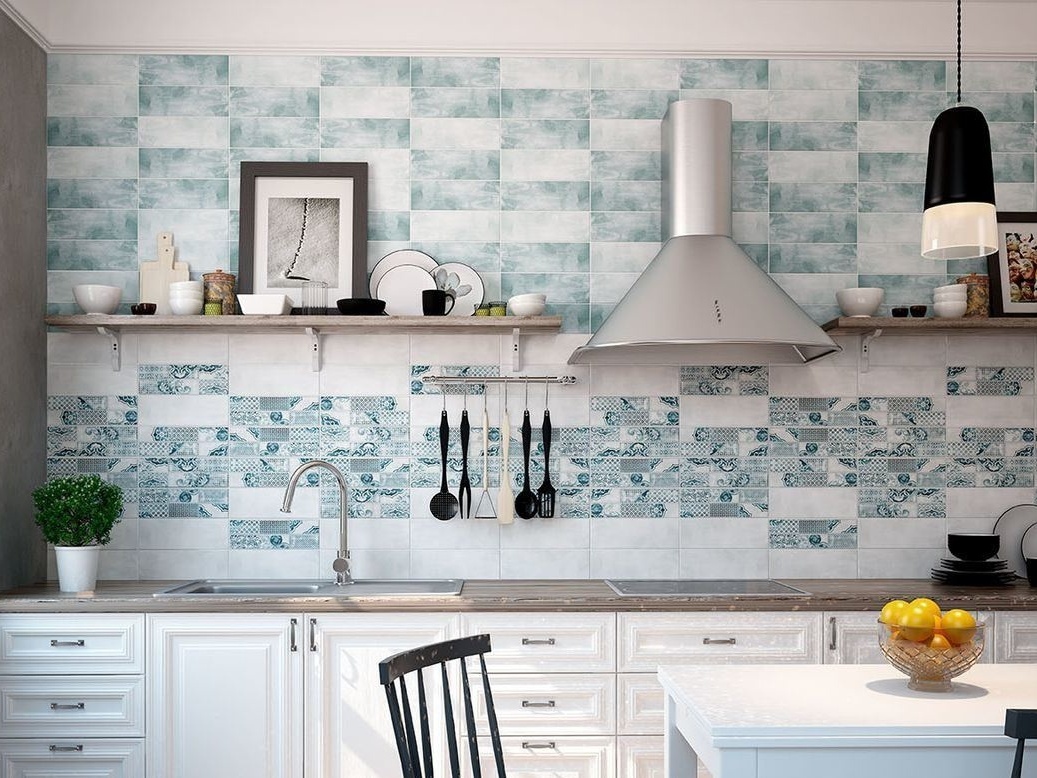
Tiled apron for the kitchen
Not everyone knows that wallpapers can also be successfully used on top of kitchen countertops. This allows you to quickly change the kitchen, creating a beautiful apron for tiles, as well as get a smooth surface, decorated with an interesting color, pattern or print. Wallpaper for the kitchen is becoming more fashionable, and their selection allows you to create really interesting effects.
Important! It is better to choose special wallpaper for the kitchen designed for this room (they are usually vinyl on a non-woven base or more expensive in the form of fiberglass), because they are resistant to many stains and high temperatures, they can be easily cleaned.
You can choose wallpapers with interesting graphics, but also those that mimic other materials, such as tiles. This option will allow you to get a juicy color finish that best suits your interior and taste. Wallpaper with a light tile will give a pleasant, sterile effect, and those created in cool colors will bring a little Greek freshness or sea relaxation, warm colors will be cozy, and red can stimulate the appetite.
The advantages of wallpaper in the kitchen:
- allow you to get interesting patterns, colors and textures;
- they are easy to clean;
- they are quite cheap and easily glued;
- some can be painted;
- allow a fairly frequent and simple change in location;
- compensate for small irregularities in the walls.
Disadvantages of wallpaper in the kitchen:
- ledges on the wall require careful processing;
- improperly selected wallpapers can quickly deteriorate and discolor.

Unusual apron kitchen tile ideas
In modern interior design trends, one can notice a slow departure from traditional finishing materials, such as ceramic tiles. An interesting alternative for them, among other things, metal or wood panels that are placed on the wall between the kitchen worktop and the top line of the cabinets, that is, in the apron area. Wall cladding made of tempered glass is also perfect, because contrary to the appearance of this material will be durable and easy to clean. In the market you will find a wide range of glass kitchen tiles decorated with various motifs. Often you can even design your own print design that will be on them.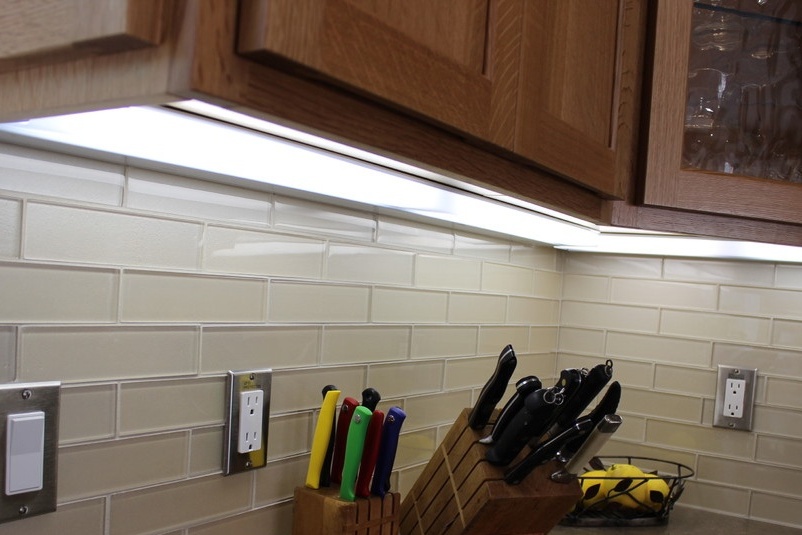
Modern design trends try to make the most out of nature. That is why there is so much interesting in the panels for the apron area in the kitchen. However, if you do not trust such decisions and are afraid that the material will not work, then you can apply a proven ceramic floor tile decorated with imitation wood. Thus, you will get an apron resembling a natural material with a characteristic grit, but much more durable and easy to care for.
Compositions in the industrial style of a loft, in which rough brick reigns on the walls, are unswervingly popular. If this almost ascetic rigor is not in our style, and you want to add a little comfort, then you can put a brick tile with an uneven texture, but with a warm shade. Wall tiles in sand-beige, light gray or even white will be perfect here.
Hexagonal tiles - for the bold
Modern interiors love unobvious solutions that diverge from what is known and traditional. Therefore, it is not surprising that kitchens designed in this way are moved away from standard and square or rectangular wall and floor tiles.So you can be carried away by imagination and choose a tile in an unusual form. Hexagonal, that is, honeycomb tiles are currently very popular to create various compositions.
Expert Advice! Hexagons fit perfectly into the Art Deco style, especially if they are in brilliant color, such as tin or gold.
Tile on apron of a kitchen
An interesting effect can also be obtained by choosing tiles of a classic shape. An excellent example of such a cladding are rectangular models, that is, boar tiles. Even the simplest form will attract attention if it is laid out in a non-standard pattern. Rectangular boar tiles, located on the wall in a decorative thin mosaic, will look unusual. You can also use them as decoration and combine them with tiles of normal sizes.


Geometric abstraction
Geometric shapes have long reigned in kitchen compositions, among them symmetrical rectangles, straight lines with decors and diamond-shaped patterns. To fit them into modern interiors, you need to add a little color to them. In this embodiment, the tile will effectively contrast with the environment, as this will further emphasize its unusualness.

Kitchen wall tiles are one of the most common ways to decorate the space between countertops and cabinets. The right choice of apron finishes can affect the final effect of the entire interior design. Think carefully about the options for the stove when planning your room. There are many options, and a huge selection of design for the apron will allow you to choose a beautiful tile for any idea.


















